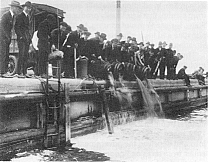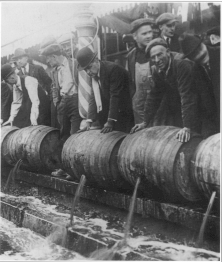Prohibition
Prohibition is the laws that are designed to prevent the
drinking of alcoholic beverages. The laws prohibit the
manufacture, sale, or transportation of such beverages. Alcoholic
beverages include beer, gin, rum, vodka, whiskey, and wine. In
the United States, prohibition became so popular in the early
1900’s that, in 1920, a prohibition amendment was added to
the U.S. constitution. This amendment, the 18th
Amendment, caused the use of alcoholic beverages to decline
sharply. However, many people ignored the national ban and drank
illegal beverages supplied by networks of bootleggers. The 18th
Amendment was abolished in 1933. It is the only amendment to U.S.
constitution that has ever been repealed.
In the 1600’s and 1700’s, the American colonists
drank large quantities of beer, rum, wine, and hard cider. Such
alcoholic beverages were often safer to drink than impure water
or unpasteurized milk and were less expensive than coffee or tea.
By the 1820’s, people in the United States were drinking the
average, the equivalent of 7 gallons of pure alcohol per person
each year. Some people, including physicians and ministers,
became concerned about he extent of alcohol use. They believed
that drinking alcohol damaged people’s health and moral
behavior, and promoted poverty. People concerned about the use of
alcohol urged supported temperance, the reduction or
elimination of the use of alcoholic beverages. By doing this,
Social reformers dumped beer into the Lake of Michigan and other
major lakes.
 At first, supporters of temperance urged
drinkers to drink only moderate amounts. But the supporters later
became convinced that all alcoholic beverages were addictive. As
a result, they tried to end the use of alcohol. In the
1820’s and 1830’s, the first temperance crusade reduced
the average annual intake of pure alcohol per person to about 3
gallons. During the 1850’s, about a dozen states passed
prohibition laws, led by Maine in 1851. From about 1900 to 1920,
numerous economic, political, and social reforms were carried out
in the United States. During this period, many reformers
supported national prohibition for many reasons. First, social
reformers blamed alcohol for poverty, health problems, and the
neglect by husbands of their wives and children.
At first, supporters of temperance urged
drinkers to drink only moderate amounts. But the supporters later
became convinced that all alcoholic beverages were addictive. As
a result, they tried to end the use of alcohol. In the
1820’s and 1830’s, the first temperance crusade reduced
the average annual intake of pure alcohol per person to about 3
gallons. During the 1850’s, about a dozen states passed
prohibition laws, led by Maine in 1851. From about 1900 to 1920,
numerous economic, political, and social reforms were carried out
in the United States. During this period, many reformers
supported national prohibition for many reasons. First, social
reformers blamed alcohol for poverty, health problems, and the
neglect by husbands of their wives and children.  Also, political reformers saw saloons
and bars as the backbone of corrupt urban political
organizations. Employers felt that drunkenness reduced their
workers’ safety and productivity. During the early
1900’s some people felt that the large numbers of recent
immigrants to the United States would become more
"American" if their drinking habits were changed. Many
religious denominations taught that drinking alcohol was immoral.
Also, political reformers saw saloons
and bars as the backbone of corrupt urban political
organizations. Employers felt that drunkenness reduced their
workers’ safety and productivity. During the early
1900’s some people felt that the large numbers of recent
immigrants to the United States would become more
"American" if their drinking habits were changed. Many
religious denominations taught that drinking alcohol was immoral.
Between 1880 and the beginning of World War I, many states
adopted either statewide prohibition or local-option laws.
Local-option laws gave individual communities the right to ban
the sale of alcohol. In 1913, congress passed the Webb-Kenyan
Act, which forbade the mailing or shipping of liquor into any
state that banned such shipments. When the United States entered
World War I in 1917 most Americans considered prohibition as an
appropriate patriotic sacrifice. In December 1917, the U.S.
Congress approved the 18th Amendment to the
constitution. The 18th Amendment went into effect in
1920 with widespread support.
Although national prohibition did not eliminate the drinking
of alcoholic beverages, it did sharply reduce their use.
Purchasing liquor was not only against the law, but it was also
very expensive. But still a large minority of Americans continued
to drink alcohol. Drinking wine, beer, and other alcoholic
beverages had been a traditional part of the cultures of many
recent immigrants to the United States, including Irish,
Italians, Jews, and Poles. Bootleggers met much of the demand for
illegal alcoholic beverages. Most bootleggers were young
immigrant men. The liquor trade was highly profitable, and
bootlegger’s battled each other for control of liquor
supplies and markets. Recent immigrants to the United States saw
prohibition as an attack on their cultural tradition. After the
Great Depression began in 1929, many people argued that
prohibition took away jobs and deprived the government of badly
needed revenues from taxes on liquor.
 At first, supporters of temperance urged
drinkers to drink only moderate amounts. But the supporters later
became convinced that all alcoholic beverages were addictive. As
a result, they tried to end the use of alcohol. In the
1820’s and 1830’s, the first temperance crusade reduced
the average annual intake of pure alcohol per person to about 3
gallons. During the 1850’s, about a dozen states passed
prohibition laws, led by Maine in 1851. From about 1900 to 1920,
numerous economic, political, and social reforms were carried out
in the United States. During this period, many reformers
supported national prohibition for many reasons. First, social
reformers blamed alcohol for poverty, health problems, and the
neglect by husbands of their wives and children.
At first, supporters of temperance urged
drinkers to drink only moderate amounts. But the supporters later
became convinced that all alcoholic beverages were addictive. As
a result, they tried to end the use of alcohol. In the
1820’s and 1830’s, the first temperance crusade reduced
the average annual intake of pure alcohol per person to about 3
gallons. During the 1850’s, about a dozen states passed
prohibition laws, led by Maine in 1851. From about 1900 to 1920,
numerous economic, political, and social reforms were carried out
in the United States. During this period, many reformers
supported national prohibition for many reasons. First, social
reformers blamed alcohol for poverty, health problems, and the
neglect by husbands of their wives and children.  Also, political reformers saw saloons
and bars as the backbone of corrupt urban political
organizations. Employers felt that drunkenness reduced their
workers’ safety and productivity. During the early
1900’s some people felt that the large numbers of recent
immigrants to the United States would become more
"American" if their drinking habits were changed. Many
religious denominations taught that drinking alcohol was immoral.
Also, political reformers saw saloons
and bars as the backbone of corrupt urban political
organizations. Employers felt that drunkenness reduced their
workers’ safety and productivity. During the early
1900’s some people felt that the large numbers of recent
immigrants to the United States would become more
"American" if their drinking habits were changed. Many
religious denominations taught that drinking alcohol was immoral.